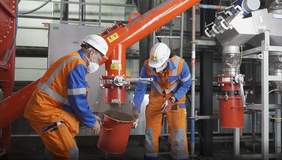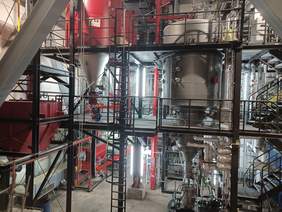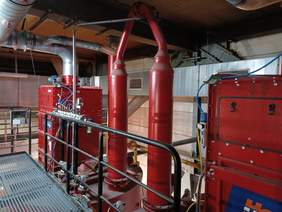Phosphorus recycling from sewage sludge will become mandatory in Germany from 2029. As a major sewage sludge recycler, RWE has therefore joined forces with Fraunhofer UMSICHT and Ruhr University Bochum to build a research plant in Niederaußem / Germany to recover phosphorus from sewage sludge.
Due to its great potential to advance the regional circular economy, the project worth EUR 6.7 million is funded by the North Rhine-Westphalian Ministry of Economics and is part of the virtual ‘Innovation and Technology Center Carbon Conversion’ (Innovations- und Technologiezentrum Carbon Conversion (ITZ-CC)).
TAF (Thermisch Apparate Freiberg GmbH) was commissioned with the planning and construction of this MFC plant. DBI-Virtuhcon, the spin-off company of TU Freiberg, supported TAF especially in process engineering design and commissioning. The project started on June 11th, 2019, and two years later, on July 6th, 2021, the pilot plant was officially put into operation. The first pilot tests to recover phosphorus are now starting.
The process of phosphorus recycling
In the converter, mixtures of sewage sludge, sewage sludge ash and lignite are exposed to high temperatures of around 1,500 degrees and a severe lack of oxygen. The aim is to release gaseous phosphorus, which – separated as purely as possible – can be processed into phosphoric acid.
Tilman Bechthold, head of research and development at RWE Power, reports: “The MFC technology is a promising way not only for disposal of sewage sludge, but also to recover valuable components.”
The MFC plant will therefore not only recover phosphorus from sewage sludge, but will also produce synthesis gas – a mixture of hydrogen and carbon monoxide. Synthesis gas can be used as a raw material for the production of methanol, methane, plastics, fuels and other feedstocks.
Phosphorus is and remains irreplaceable
As a vital raw material and necessary for the production of artificial fertilizers, phosphorus is indispensable in agriculture and horticulture- However, its fossil reserves are limited. Its recovery from sewage sludge can therefore contribute to a sustainable solution to this issue.
Jonas Kappeller, General Manager of TAF, is optimistic: „The multi-fuel conversion plant was completed on schedule. This means that nothing blocks the new sewage sludge regulation and we are taking a decisive step towards a sustainable future!”
More information
Find out more about the project here.
Experience the plant first-hand: click here for a video: https://rwe.canto.global/direct/video/u9bbijb3np0lvbc9a324bhiq7g/XxCALQLgr-P_Gm1O5qX69QZDqfQ/play
(Copyright: RWE AG)









![[Translate to Englisch:] [Translate to Englisch:]](https://www.poerner.at/fileadmin/_processed_/1/8/csm_RWE-Phosphor-Grafik-Version-06_Gesamtansicht_21ef595a4d.jpg)


